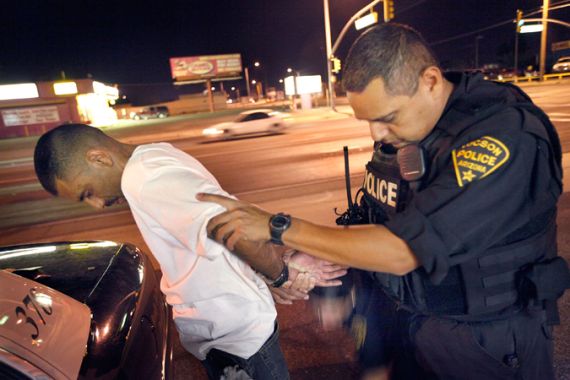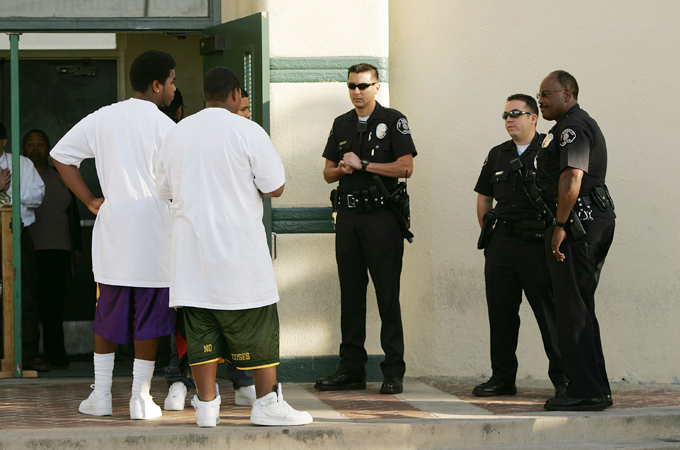A layer cake of racist lies
A political scandal involving LA City Councilwoman Janice Hahn reveals how prevalent racism is in the US justice system.

 |
| The US jails a larger proportion of its black community than South Africa did at the height of Apartheid [GALLO/GETTY] |
“It may be racist, but it’s true.”
That, in essence, is how the National Republican Congressional Committee both denounced and defended what has been called the most offensive political advert of all time – an “attack ad” depicting Los Angeles City Councilwoman Janice Hahn as a demonic stripper surrounded by armed black thugs.
In reality, it’s just the opposite: not only racist, but false in more ways, at more levels, than most people even begin to imagine. Let’s start with the immediate charges the Republicans invoke.
“Are House Democrats using the disgraceful web ad in an attempt to distract voters from Janice Hahn’s reported ties to LA gang members?” a press release from the NRCC asks, linking to a three-year old TV report by the LA Fox affiliate, which contained accusations that Hahn – a candidate for Congress in a special election – funnelled city funds to active gang members.
The TV report included damning accusations by said gang members, who were backed up by two disaffected police officers – Ryan Moreno and Chuck Garcia. But the report was completely debunked within weeks by a suburban Republican-leaning newspaper.
The report aired on April 30, 2008, and was picked to pieces by reporter Gene Maddaus in the Daily Breeze on May 14, 2008. Summarising his findings, Maddaus wrote: “A review of the Fox 11 News story found major flaws that undermine its central allegations. Most notably, records and interviews show that the gang intervention workers identified in the report have not received city funding. Additionally, a convicted rapist was wrongly identified as a gang intervention worker, and Hahn was mistakenly accused of providing funds directly to gang workers.”
I co-wrote a follow-up piece, further exploring the spread of false accusations. Hahn’s political enemies tried to milk the story for everything they could, but without success. The local Chamber of Commerce quickly distanced itself from one local leader who attacked Hahn, and a pillar of the local social service community blasted the TV report from stem to stern.
“We never hired anyone unless they were interviewed by the LAPD,” said Howard Uller, the recently retired long-time head of the organisation through which the gang intervention program was run. “Anyone that was actively [involved in gang activity], we didn’t hire.”
Fox 11 never responded to the debunking, and the real story behind the story became clear when the two accusing police officers lost a federal lawsuit alleging that they had been unfairly transferred out of the gang unit. Their attempt to try the case in the media failed.
So, not only were charges against Hahn a lie, they were a cover-up as well: a cover-up for the real wrong-doing which involved in a broader, more basic realm of lies – the realm in which entire communities had been criminalised by police for the colour of their skin.
As the Breeze story explained, the conflict between Hahn and the two officers arose because she passed on community complaints against the two, whose behaviour reportedly undermined the purpose of the gang task force, which was intended to build trust and improve police-community relations as part of the department’s shift away from a harshly adversarial approach, and toward the model of “community-based policing”.
LAPD: ‘an occupying army’
“The complaints that would come up the most were complaints about disrespect, even name calling,” Hahn told the Breeze. “You would hear from the community that it was very difficult to work with LAPD when these two officers are doing X, Y and Z – being antagonising and disrespectful. It just kept coming up from everywhere.”
For the better part of a century, the LAPD had operated almost like an army – an occupying army in minority neighbourhoods, as author Joe Domanick explained in detail in his 1994 book, To Protect and to Serve: The LAPD at War in the City of Dreams, published in the aftermath of the 1992 Rodney King riots.
A devastating critic of the LAPD at the time, Domanick has been quite supportive of the department’s subsequent shift to a community-cooperative model over the past decade. But there are clearly still strong pockets of resistance.
In a September 2010 LA Times op-ed, Domanick wrote about current LAPD Chief Charlie Beck. “When he commanded the South Bureau – that sprawling section of black and latino LA – he told me: ‘People here have started cooperating with us because we aren’t just talking nice to them, we are building collateral. These folks … have been marginalised for years. A lot of it is open dialogue, and treating them like equals and not like some lower species you’re guarding at the zoo, which is definitely the way we [the LAPD] did it in the past.'”
Moreno and Garcia were part of that past, refusing to follow orders from new leadership to embrace a more positive, more successful approach to crime-fighting.
But there is much more to that past than just on-the-street policing attitudes. There is yet another, deeper and broader realm of racial lies to be exposed. For while the LAPD itself has changed remarkably, the larger criminal justice system that they are part of remains deeply divisive, dysfunctional and racist, as described by law professor Michelle Alexander in The New Jim Crow: Mass Incarceration in the Age of Colorblindness.
“The United States imprisons a larger percentage of its black population than South Africa did at the height of apartheid,” Alexander writes.
“In Washington DC, our nation’s capital, it is estimated that three out of four young black men (and nearly all of those in the poorest neighbourhoods) can expect to serve time in prison. Similar rates of incarceration can be found in black communities across America.”
This is overwhelmingly a result of the “war on drugs”, and the fact that blacks are stopped, arrested, tried, convicted and sentenced for drug crimes at rates far higher than whites, even though their levels of drug use and selling are virtually identical.
The racial and political consequences are profound, Alexander explains. “Once a person is labeled a felon, he or she is ushered into a parallel universe in which discrimination, stigma, and exclusion are perfectly legal,” he says.
The initial incarceration is only the beginning. In 1980, only one per cent of prisoners were there for parole violations, says Alexander. Twenty years later, that figure was up to 35 per cent – roughly as many people as the entire prison population in 1980.
Of that figure, “two-thirds were returned for a technical violation such as missing appointments with a parole officer, failing to maintain employment, or failing a drug test. In this system, failing to cope well with one’s exile status is treated as a crime”.
Blacks are not the only victims, of course. Hispanics suffer from a similar pattern. But after all the racial lies have been examined on their own, there still remains the way in which they infect the entire body politic.
For this, we turn to Christian Parenti’s 1999 book Lockdown America: Police and Prisons in the Age of Crisis, which underscored how US society as a whole has become more punitive – beginning in the 1970s when the “crises of over-production, declining profits, and the domestic challenge of racial and class rebellion required a move away from the politics of the carrot toward the politics of the stick”.
People of colour may have suffered first and most by an enormous margin, but the punitive, demonising logic involved has no stopping point, as we’re now seeing the entire US middle class being threatened with immediate decimation and long-term extinction.
The recognition may be late in dawning for some, but the logic is clear, as Martin Luther King explained more than 40 years ago: “You cannot keep a man down in a ditch unless you linger there with him.”
It may be anti-racist. But it’s true.
Paul Rosenberg is the Senior Editor of Random Length News, a bi-weekly alternative community newspaper.
The views expressed in this article are the author’s own and do not necessarily represent Al Jazeera’s editorial policy.
